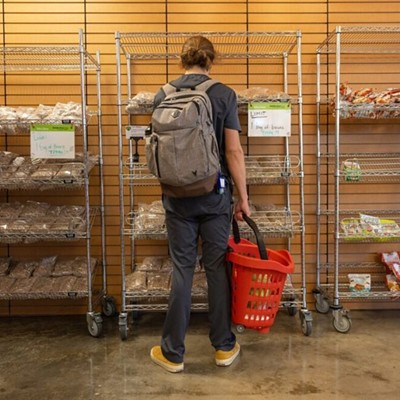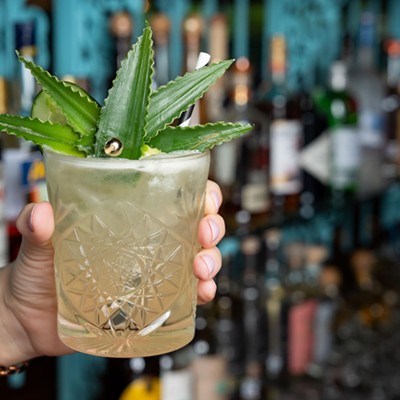The latest round of anti-Muslim rhetoric to spew forth from the nation's right-wing extremists has formed from the strangest combination of ingredients: Canada and Campbell's soup.
News that Americans have started a Facebook group called "Boycott Campbell Soup" [sic] -- which has nearly 3,500 members -- springs from the fact that Campbell's began offering 15 of its products as halal-certified...in Canada, not America...months ago. The Facebook page seems to have been inspired by think-pieces from the extreme right with purposefully incendiary headlines like "Sound the Sharia Alarm! Campbell's Makes Halal Soups!" and "Campbell's Soup Goes Halal to Appease Terrorist-Funded Group."
Samples from the Facebook group's wall include such thoughtful gems as:
The last word found in the black box of those 9/11 planes is "Allahu Akbar" and you muzzies also use this shit word during slaughting animals to make it halal. So, we if we take halal meat that means we dishonor the martyrs of 9/11.
This is just another way that terrorism and it's sponsors are insinuating themselves into our culture, Terrorists are NOT freedom fighters they are murderous thugs and I will not pay money for soup or any other product that supports, aids or abetts their tactics. Hope someone puts a list out of all of Campbell's affiliates.
These, and many other comments, indicate that there seems to be a lot of misunderstanding around halal practices in general and Campbell's decision to offer halal-certified soups in -- once again -- Canada, not the United States.
Strangely, the same people who cry foul over halal foods don't bat an eyelash at kosher foods, which are prepared in roughly the same manner and with the same religious undertone -- but that's because kosher food is prepared for and by Jewish people. Thankfully, Jews no longer suffer the same stigma, ostracization and discrimination on a massive scale as they once did. Unfortunately, that mindset has now shifted toward Muslim targets.
To be clear, halal food is simply food that has been prepared to strict Muslim specifications. In the case of meat, according to Halal Food Production, it means that the animal or bird in question has been raised on halal-approved feed and has been slaughtered through a straight cut across the throat, windpipe and jugular veins by a trained technician who fully bleeds the animal out before it's processed in a halal-compliant facility. The animal must also be prayed over before it's slaughtered. Those prayers are simple and straightforward: Bismillah ("In the name of God") and Allahu akbar ("God is great").
The reason "Allahu akbar" may sound familiar is that it's used all day long by practicing Muslims, whether as part of the daily prayers or as an exclamation of excitement, thankfulness or distress. The black box salvaged from Flight 93 contained these words, it's true. But so did the black box from another flight -- the deadly Garuda Indonesia Flight 152 -- where the pilot's last words before accidentally crashing into a forest were "Allahu akbar," said as a final prayer of absolution before his untimely death.
Like any phrase in any language in any religion, "Allahu akbar" can have many meanings. Extremists and terrorists may have distorted it for their use, but that doesn't mean the prayer itself -- "God is great" -- carries terrorist implications any more than the Hail Mary carries terrorist implications because members of the Provisional Irish Republican Army recited it before carrying out bombings in the 1970s.
To a Muslim, saying a blessing over the meat has religious implications, just as saying grace over a meal has to Christians. But to someone who has no dog in the fight, a Muslim blessing the meat is simply indicative of one more step in the process that ensures people who've been trained to slaughter and handle meat are doing their job correctly. If a blessing isn't said over the meat, then what else isn't being done correctly?
And therein lies the crux of the issue: Halal meat is handled differently than non-halal meat from beginning to end. There aren't necessarily steps in place to ensure that halal meat is healthier or better for you than haram, but you can at least be sure that halal meat has been processed to incredibly high and very strict standards. This often means the meat is cleaner, but not always. On the other hand, I'm more comfortable buying Hebrew National hot dogs over other brands because I feel the kosher hot dogs' meat is of higher quality (although studies have shown that the other ingredients are virtually the same when compared to other brands).
I feel a similar sense of comfort when eating halal meat; I feel that -- regardless of religious affiliation -- the meat has been tended to with more care than what it would normally be given in a run-of-the-mill slaughterhouse. Reports on halal slaughterhouses in New York indicate a much different attitude towards the meat than most Americans hold; there's something slightly more sacred and personal at play when you choose your cow before it's slaughtered. There is a deeper respect for the task at hand and the animal that's giving its life for you.
In the past, there have been issues with slaughterhouses "self-certifying" themselves as halal. It's still an ongoing concern in France, where an estimated 40 to 50 percent of "halal" products and meat don't actually adhere to proper halal guidelines. Enter organizations like the Islamic Society of North America (ISNA), whose mission is to bring "individuals and communities together to address issues impacting Islam and Muslims." The ISNA also serves a fundamentally useful purpose when it comes to food: certifying food and facilities so that the nearly 8 million Muslims in North America know that what they're eating is truly halal.





